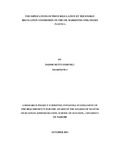| dc.contributor.author | Dadoh, Betty O | |
| dc.date.accessioned | 2013-11-26T12:21:41Z | |
| dc.date.available | 2013-11-26T12:21:41Z | |
| dc.date.issued | 2013-10 | |
| dc.identifier.citation | Dadoh,Betty O.;October,2013.The Implications Of Price Regulation By The Energy Regulation Commission On The Oil Marketing Strategies In Kenya. | en |
| dc.identifier.uri | http://erepository.uonbi.ac.ke:8080/xmlui/handle/123456789/60479 | |
| dc.description.abstract | The implications of price regulation, whether it is economic regulation or social
regulation, are likely to depend on a variety of factors. Price regulation is adopted in
order to increase consumer welfare by putting a cap on the maximum price that can be
charged on petroleum products and in turn lowering supplier profits. This study was
guided by two objectives: to establish the implications of price regulation on the oil
marketing strategies in Kenya; and to determine the effectiveness of oil marketing
strategies adopted to cope with price regulation in Kenya. A descriptive survey of all
oil marketing companies in Kenya was conducted. The target population of this study
was all the 45 registered oil marketers in Kenya from which all were targeted but only
35 firms took part in the survey (response rate is 78%). Primary data was collected
through structured questionnaires administered by the researcher to the marketing
managers using a drop-and-pick later method. The analysis was done using paired ttests
and descriptive analysis (percentages, mean and standard deviations). Results
were presented in tables and charts. The study found that pricing regulations
significantly affected the pricing strategy but not the entire marketing strategy of oil
marketing firms as they were still effective, although the effectiveness had marginally
reduced. The study also concludes that marketing strategies before and after the
introduction of pricing regulations were not significantly different in terms of their
effectiveness and therefore the regulations did not significantly influence the
effectiveness of marketing strategies of oil marketing firms in Kenya. It also found
that improved service quality and offering high quality products were the most
adopted strategies by most firms while innovation and pricing strategy where oil
marketers price lower than their competitors were the least employed strategies. The
study also found that the intensity of competition was low after the introduction of
price regulations and that the price of fuel in the regulation era was marginally lower
than the period before price regulations. The study recommends that oil marketing
firms should focus on innovation, quality of products, and superior customer service
in order to compete in the market. A marketing strategy that focuses on building
better customer relationships would provide a better avenue for oil firms to compete. | en |
| dc.language.iso | en | en |
| dc.publisher | University of Nairobi | en |
| dc.title | The Implications of Price Regulation by the Energy Regulation Commission on the Oil Marketing Strategies in Kenya | en |
| dc.type | Thesis | en |
| local.publisher | School of Business | en |

